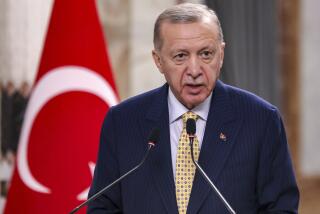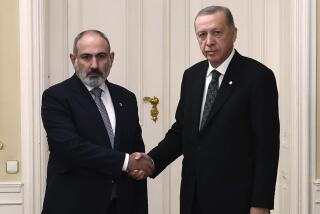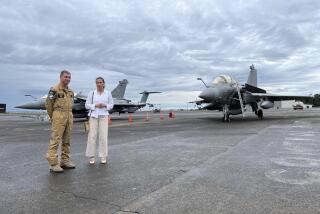NATO will deploy Patriot missiles on Turkey’s border with Syria
BEIRUT — The North Atlantic Treaty Organization on Tuesday agreed to deploy Patriot anti-missile batteries along the Turkish border with Syria, providing a measure of security for Turkey in case of an airborne attack from its war-ravaged neighbor.
The decision, which had been anticipated for weeks, brings the U.S.-led alliance closer to the conflict in Syria, though officials asserted that the missiles would have no offensive role.
“Any deployment will be defensive only,” NATO foreign ministers said in a statement that explicitly ruled out the use of the missile system to curb Syria’s bruising air assault on domestic rebels. “It will in no way support a no-fly zone or any offensive operation.”
The Patriot surface-to-air missiles could theoretically target any Syrian ballistic missile or warplane that crossed into Turkish airspace, armed with conventional or chemical weapons.
The move, which was requested by Turkey, demonstrated NATO members’ sense of solidarity with the nation, which forms the eastern bulwark of the 28-member organization. But the step also sent a pointed message to Syria that the world’s most powerful military alliance is poised on its doorstep.
Syria and its chief allies, Russia and Iran, have called the Patriot deployment provocative and likely to exacerbate tension and possibly lead to new armed confrontations along the two nations’ more than 500-mile frontier.
“We share Turkey’s concern about the developments on the border,” Russian President Vladimir Putin said Monday in Istanbul. “But we are calling for restraint because increasing [military] potential will not settle the situation, but create the opposite effect.”
Russia is keen to maintain its influence in Syria and avoid a Libya-style Western-led intervention there. Last year, months of bombing runs by NATO warplanes contributed directly to the ouster of former Libyan strongman Moammar Kadafi.
The planned anti-missile deployment comes as President Obama and other top U.S. officials bluntly warned Syria this week that use of chemical weapons would not be tolerated. Some reports have indicated that desperate Syrian authorities, having suffered losses of territory and infrastructure to rebels, have moved chemical stockpiles and could be preparing them for use.
NATO ministers expressed “grave concern” about any prospective Syrian use of chemical weapons, the alliance said in a statement.
“The possible use of chemical weapons would be completely unacceptable for the whole international community,” NATO Secretary-General Anders Fogh Rasmussen told reporters in Brussels, where ministers approved the anti-missile deployment in Turkey.
International observers say Syria is known to have stocks of several chemical weapons, including mustard gas and sarin, a nerve agent. Damascus says it would contemplate using such substances, “if they exist,” only in the case of a foreign attack on its territory.
In Washington, White House officials would not say what prompted Obama’s warning to Syrian President Bashar Assad on chemical arms, noting only that U.S. officials “closely monitor Syria’s proliferation-sensitive materials and facilities.”
Aides to Obama say the U.S. is concerned that Assad’s chemical weapons could fall into the wrong hands. But White House Press Secretary Jay Carney said the administration believes Syria still has them secured.
“It is our belief, based on our monitoring, that those weapons remain in control of the Syrian regime,” Carney said Tuesday.
In Syria on Tuesday, pro-government media reported that an artillery or mortar round hit a school outside Damascus, and a pro-opposition group said at least eight students and a teacher were killed.
The accounts from pro-government television stations variously blamed “terrorists” or “armed groups,” the labels used to describe rebel forces. In its report on the death toll, the Britain-based pro-opposition Syrian Observatory for Human Rights did not say which side fired the deadly projectile. Throughout the Syrian conflict, each side has generally blamed the other for the killing of civilians.
Turkey and Syria, once close allies, have become bitter enemies since Turkey backed the rebellion against Assad.
In perhaps a sign of how eager Turkish officials were to have the protection of Patriot missiles, they announced last month that the alliance had agreed to the step, only to have discussions continue for two weeks.
NATO is expected to deploy as many as half a dozen Patriot batteries along Turkey’s border with Syria, officials said. The batteries, and forces capable of operating them, could be supplied by the United States, the Netherlands or Germany, according to NATO.
Though the Patriot batteries are designed as an anti-missile system, the weapons can also be used to shoot down aircraft. Syrian warplanes have regularly hit rebel positions along the border, most recently on Monday in the northeastern Syrian border town of Ras Ayn, sending panicked residents running across the border into Turkey.
But, to date, errant Syrian mortar and artillery shells landing on the Turkish side of the border have been the major irritant to Turkey. Dozens of Syrian shells have struck Turkish territory, mostly landing harmlessly.
In one instance, however, a Syrian shell struck a home in a Turkish border town in October, killing five people and causing public outrage. After that incident, Turkey began firing artillery rounds into Syria in retaliation for artillery strikes on Turkish territory. Turkey also scrambles fighter jets regularly in a show of force.
Times staff writer Christi Parsons in Washington contributed to this report.
More to Read
Sign up for Essential California
The most important California stories and recommendations in your inbox every morning.
You may occasionally receive promotional content from the Los Angeles Times.










